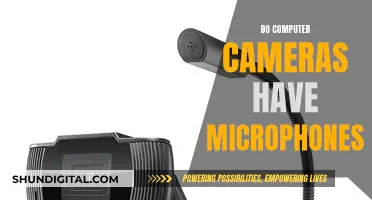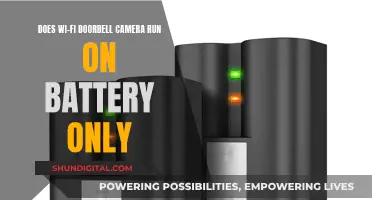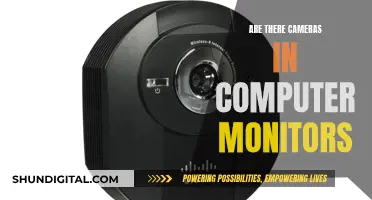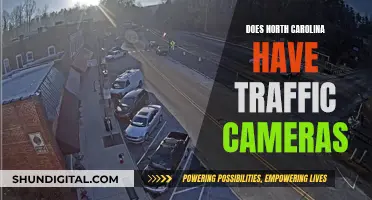
Texas banned the use of photographic traffic enforcement systems in 2019, including red-light cameras and cameras that catch people speeding. This means that no one in Texas can receive a speeding ticket in the mail. However, there are still some cities in Texas with operating traffic cameras, including Humble, Amarillo, Leon Valley, and Balcones Heights. While tickets from these cameras are not enforceable, some people may still choose to pay them to avoid potential consequences such as debt collection calls or a blocked vehicle registration.
| Characteristics | Values |
|---|---|
| Camera tickets legal in Texas? | No, they were banned in 2019. |
| Camera tickets enforceable? | No, but some cities continued to use them until their contracts with vendors expired. |
| Tickets received from remaining cameras enforceable? | Technically no, but some people choose to pay them to avoid potential consequences such as a blocked vehicle registration or a hit to their credit score. |
What You'll Learn

Camera tickets are not admissible in court
In 2019, Texas banned the use of red-light cameras and camera-generated speeding tickets. This means that tickets issued by cameras are not admissible in court.
According to code 707.021 of the Texas Transportation Code, a local authority is prohibited from issuing a criminal or civil citation or charging you for a violation based on a recorded traffic signal enforcement photo. This means that if you receive a camera ticket in Texas, you cannot be legally charged for the violation.
The ban on camera-generated tickets was enacted due to privacy concerns and the invasion of privacy that many Texas drivers felt due to the presence of these cameras. As a result, Texas Governor Greg Abbott signed House Bill 1631 into law, effectively banning the use of red-light cameras and camera-generated speeding tickets statewide.
While some cities in Texas, such as Balcones Heights, Humble, Leon Valley, and Amarillo, were allowed to continue using these cameras until their existing contracts expired, the law makes it clear that camera-generated tickets are not admissible in court and cannot result in criminal or civil charges.
It is worth noting that while camera tickets are not admissible in court, there may still be consequences for failing to pay these fines. In some cases, the Texas Department of Motor Vehicles or the county assessor may block the registration of the vehicle that violated the law, which is known as a "scofflaw block." Additionally, the city where the violation occurred may start collections on the fine, which could impact your credit score.
Cleaning Corroded Camera Battery Terminals: DIY Guide
You may want to see also

Tickets can be issued by mail
In 2019, Texas banned the use of red-light cameras and camera-generated speeding tickets. This means that no one in Texas can receive a speeding ticket in the mail. However, certain cities, such as Humble, Leon Valley, Balcones Heights, and Amarillo, were able to continue using these cameras until their existing contracts with vendors expired.
Before the ban, a traffic camera ticket was issued by mail when a vehicle was detected running a red light or speeding through an intersection by an enforcement camera. The fine was considered a civil violation, similar to a parking ticket, and would not count against the driver's record or increase insurance costs.
If an individual chooses not to pay a camera ticket, it may be sent to a collection agency, and they may begin receiving collection calls. Additionally, the state's Department of Motor Vehicles or the county assessor may prevent registration of the vehicle that violated the law, known as a "scofflaw block". However, Texas law prohibits the debt from being reported to a credit bureau or impacting an individual's credit score.
It is important to note that while camera tickets cannot lead to an arrest, they can still result in fines and legal consequences. For specific legal advice regarding camera tickets in Texas, it is recommended to consult with a lawyer or legal professional.
Charging Your GE X600 Camera: A Quick Guide
You may want to see also

Tickets may be sent to a collection agency
If you don't pay a ticket in Texas, it may be sent to a collection agency. This can happen if you don't respond to the ticket within a certain timeframe or fail to appear in court to contest the citation. The consequences of having a ticket sent to collections can be serious and far-reaching.
When a ticket is sent to a collection agency, the amount you owe typically increases due to the addition of collection fees and other penalties. These fees can significantly increase the cost of the ticket, making it even more challenging to pay off. The collection agency may also report the unpaid debt to the credit bureaus, potentially impacting your credit score and affecting your ability to secure loans, housing, or even employment.
In addition to financial consequences, failing to pay a ticket or respond to a collection agency can result in legal repercussions. You could face an arrest warrant, a driver's license suspension, or additional criminal charges, depending on the circumstances. It's important to take these matters seriously to avoid complications.
To prevent a ticket from being sent to collections, it's crucial to be proactive. When you receive a ticket, carefully review it and understand your options, such as paying the fine, requesting a hearing, or exploring defensive driving courses to dismiss the ticket. Each county in Texas may have unique procedures, so refer to your citation or contact the relevant court for guidance.
If you're unable to pay the ticket by the due date, don't ignore the situation. Reach out to the court directly, explain your circumstances, and explore alternative solutions. Some courts may offer payment plans or extensions to assist individuals facing financial difficulties. Being proactive and communicating your situation demonstrates a good-faith effort and may lead to more favorable outcomes.
Applying Camera Raw Presets: A Step-by-Step Guide
You may want to see also

Tickets do not count against your driving record
While camera tickets are legal in Texas, they do not count against your driving record. This means that if you are caught by a camera running a red light or speeding, for example, it will not result in any demerit points on your license. This is because these types of violations are treated as civil penalties, rather than criminal offenses, and are therefore not reported to the Texas Department of Public Safety (DPS).
The DPS is the state agency responsible for maintaining driver records and issuing licenses. Since camera tickets are not reported to the DPS, they do not appear on your driving record. This is in contrast to traditional tickets issued by a police officer, which are reported to the DPS and do count against your driving record.
It's important to note that while camera tickets don't affect your driving record, they can still result in a fine. The fine is typically lower than that of a traditional ticket and is handled through the mail. You won't be arrested or summoned to court for a camera ticket, but failure to pay the fine can result in late fees and other penalties.
There may also be some locations in Texas where camera tickets are not issued at all, where the cameras are used solely for monitoring and any violations result in a traditional ticket from a police officer, which does count against your driving record.
Overall, while camera tickets in Texas can result in a fine, they are a civil matter and do not carry the same weight as a ticket issued by a police officer. So, while no one enjoys receiving a fine in the mail, it won't impact your driving record or result in demerit points.
Reolink Cameras: Made in China?
You may want to see also

Some cities are exempt from the ban
While red-light cameras are banned across Texas, some cities are exempt from this legislation. These exemptions are due to existing contracts and agreements in place before the statewide ban was implemented.
The Texas Transportation Code allows red-light camera programs to continue in operation if they were authorized by a local election before a specific date. This date, according to the statute, is "on or before the last Sunday in May, 2017." This means that any city with a red-light camera program approved by voters before this date can continue to use the cameras and issue tickets.
Several cities in Texas fall under this exemption, including Balch Springs, Dallas, Garland, and Rowlett. These cities had their red-light camera programs approved by voters prior to the specified date and are therefore legally permitted to continue their use. The legislation also outlines that these cities must continue to hold elections to renew the authorization of these camera programs periodically, ensuring ongoing approval from the community.
The exemptions in these cities are a result of the legislative process and the specific wording of the Texas Transportation Code. While the statewide ban on red-light cameras shows a clear direction from the state, the exemptions highlight the importance of local elections and the power they give to communities to make their own decisions regarding traffic enforcement. This situation showcases the complex interplay between state and local laws and how they shape the enforcement of traffic regulations across Texas.
Simplisafe Camera Battery: Charging Time Explained
You may want to see also
Frequently asked questions
Yes, camera tickets are legal in Texas. Texas is one of many states that allow red-light cameras and speeding cameras.
Camera tickets, also known as photo radar, are a way for law enforcement to catch drivers who are speeding or running red lights using automated cameras. These cameras take a picture of the vehicle's license plate and a ticket is then issued to the registered owner of the vehicle.
The cost of a camera ticket in Texas can vary depending on the location and the severity of the offense. Fines can range from $50 to $200 or more.
Failure to pay a camera ticket in Texas can result in additional fines, late fees, and other penalties. In some cases, your vehicle registration may be suspended until the fine is paid.







